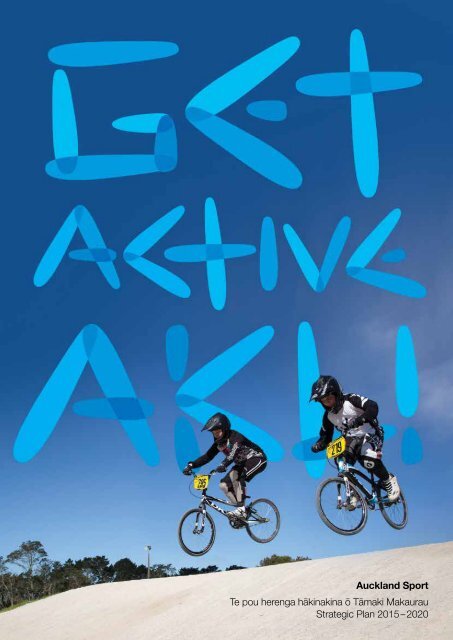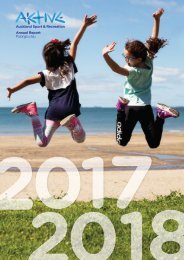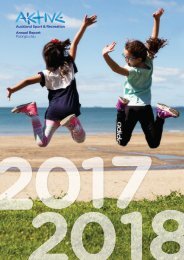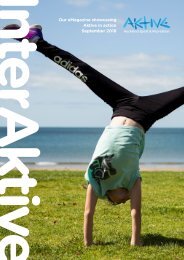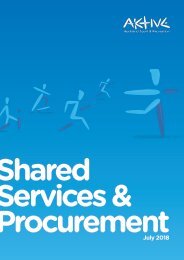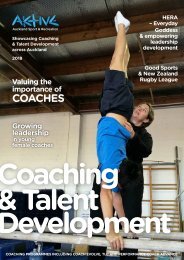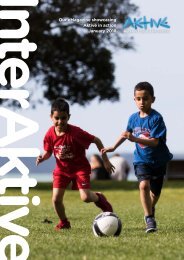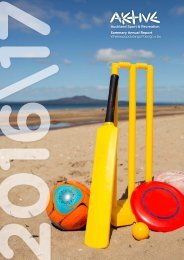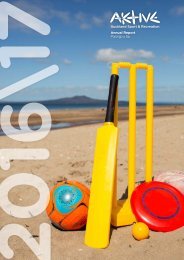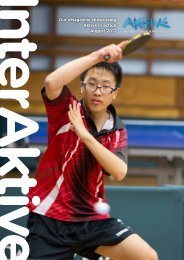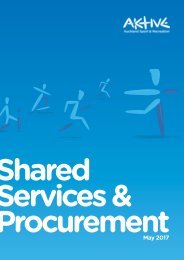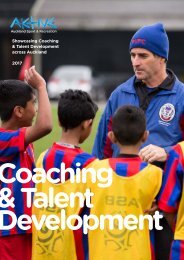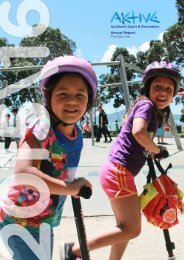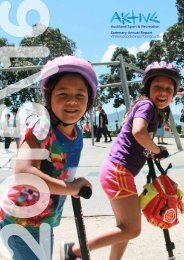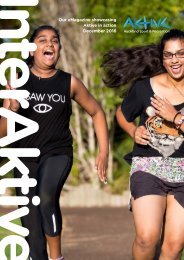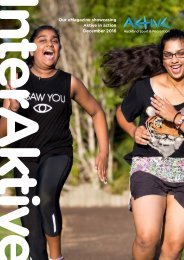Aktive Strategic Plan 2014
You also want an ePaper? Increase the reach of your titles
YUMPU automatically turns print PDFs into web optimized ePapers that Google loves.
Auckland Sport<br />
Te pou herenga häkinakina ö Tämaki Makaurau<br />
<strong>Strategic</strong> <strong>Plan</strong> 2015 – 2020
Vision 2020<br />
He whakakitenga 2020<br />
Auckland –<br />
the world’s most<br />
active city<br />
Tämaki Makaurau – te täone<br />
ngangahau rawa o te ao.<br />
Our vision is to be the world’s<br />
most active city.<br />
We want Aucklanders to be<br />
active for life because of the<br />
sheer joy they experience<br />
from participating in sport<br />
and recreation.<br />
We also know that when people<br />
are physically active:<br />
• It helps them to learn<br />
• They’re healthier<br />
• They’re happier<br />
• They’re more connected to other people<br />
• Our economy benefits<br />
Our role is to collaborate with Sport NZ,<br />
Auckland Council, the sport and recreation<br />
sector and all other partners who share our<br />
vision, to bring about shared benefits in<br />
health and education, along with economic<br />
and community development. Our strategic<br />
priorities are closely aligned with key partners.<br />
In working towards our vision we need to bring<br />
more investment and value to the sport and<br />
recreation sector without increasing cost. We’ll<br />
do this by teaming up with partners to create<br />
efficiency. Part of our role is to ensure the long<br />
term financial sustainability of our sector.<br />
We will be known for strong leadership,<br />
advocacy, innovation and collaboration.<br />
We’ll operate as a trusted first point of<br />
contact for the sport and recreation sector<br />
in Auckland, will always follow through on<br />
our commitments, and will hold ourselves<br />
accountable for results.<br />
We will reflect a commitment to the Treaty<br />
of Waitangi by proactively engaging and<br />
supporting the aspirations of Mäori and iwi.
M<br />
E IT COUNT
Mission<br />
Whainga Matua<br />
To collaborate, set direction<br />
and provide regional leadership<br />
for Auckland's sport and<br />
recreation communities.<br />
Kia mahitahi, kia tau te aronga,<br />
kia kökiri i ngä häkinakina me<br />
te mahi a Rëhia mo te rohe o<br />
Tämaki Makaurau.
Values<br />
Ö tätou Uara<br />
Our Values reflect a sporting<br />
approach, and a drive to<br />
achieve results for our partners<br />
and for Aucklanders.<br />
Gutsy<br />
Kia maia<br />
We make transparent,<br />
bold decisions in pursuit<br />
of our vision for Auckland.<br />
Team Up<br />
Kia tü takitini<br />
We succeed by trusting<br />
and playing to each other’s<br />
distinctive strengths.
Relentless<br />
Kia manawa piharau<br />
We have the passion and<br />
perseverance to achieve<br />
our goals.<br />
Go Hard<br />
Kia kaha<br />
We work with intensity,<br />
urgency and vigour.<br />
Play it Straight<br />
Kia täkaro tötika<br />
We deal with the facts, focus<br />
on solutions, and treat everyone<br />
fairly and with integrity.
<strong>Strategic</strong><br />
<strong>Plan</strong><br />
Mahere Rautaki<br />
Rautaki Matua<br />
<strong>Strategic</strong> Priority<br />
Whainga<br />
Goals 2015 KPI 2020 KPI<br />
More<br />
Aucklanders<br />
More Active<br />
More of Auckland’s young<br />
people participating in sport<br />
and recreation<br />
60% of school aged children<br />
(5-18 year olds) take part in<br />
3+ hours of organised sport a week<br />
(2011 baseline 57%)<br />
70% of school aged children<br />
(5-18 year olds) take part in<br />
3+ hours of organised sport a week<br />
(2011 baseline 57%)<br />
65% of school-aged children<br />
(5-18 year olds) take part in<br />
3+ hours informal sport a week<br />
(2011baseline 63.5%)<br />
75% of school-aged children<br />
(5-18 year olds) take part in<br />
3+ hours informal sport a week<br />
(2011 baseline 63.5%)<br />
Engage with international cities<br />
that encourage active lifestyles<br />
Cities identified and international<br />
activity benchmark established<br />
Improvement on benchmark<br />
More of Auckland’s adults<br />
participating in sport and<br />
recreation<br />
Establish the percentage of adults<br />
(15 years and over) who are physically<br />
active (i.e. met physical activity<br />
guidelines in last 7 days)<br />
Successive annual increases<br />
on baseline<br />
More volunteers (coaches,<br />
officials) participating in sport<br />
and recreation<br />
500 new coaches recruited 2,000 more coaches recruited<br />
600,000 more volunteer hours<br />
achieved (+5%) (2006/7 Active NZ<br />
survey baseline)<br />
More participation amongst<br />
priority communities<br />
Identify priority communities and<br />
baseline measures<br />
Increase in priority communities’<br />
activity levels<br />
Stakeholder<br />
alignment<br />
& sector<br />
development<br />
Added value as a result of<br />
Auckland Sport and Regional<br />
Sports Trusts (RSTs) working<br />
collaboratively<br />
Aligned high level strategic outcomes –<br />
Auckland Sport and RSTs<br />
Shared services set up (Finance, IT,<br />
Marketing, CRM, Legal, HR)<br />
% of expenditure on corporate<br />
services to revenue is equal to or<br />
less than 2012-13<br />
Aligned high level strategic outcomes –<br />
Auckland Sport and RSTs<br />
Additional organisations using<br />
Auckland Sport’s shared services<br />
% of expenditure on corporate<br />
services to revenue is equal to or<br />
less than 2012-13<br />
Recognition by Sport NZ of increased<br />
value of sport and recreation activity in<br />
Auckland<br />
Increased focus on coach<br />
development<br />
500 new coaches have received<br />
Greater Auckland Coaching Unitdelivered<br />
professional development<br />
2,000 coaches have received Greater<br />
Auckland Coaching Unit-delivered<br />
professional development<br />
Satisfaction survey benchmark<br />
established<br />
Satisfaction survey improvement<br />
Improved regional sport<br />
& recreation capability<br />
Identify priority organisations and<br />
assess their capability<br />
Capability improvement measured
12<br />
million hours<br />
volunteered for<br />
sport and recreation<br />
in Auckland annually<br />
Rautaki Matua<br />
<strong>Strategic</strong> Priority<br />
Whainga<br />
Goals 2015 KPI 2020 KPI<br />
Stakeholder<br />
alignment<br />
& sector<br />
development<br />
Auckland Sport demonstrates<br />
organisational excellence<br />
Sport NZ Organisational Development<br />
Tool (ODT) review sets baseline<br />
Governance reviewed<br />
Financial sustainability achieved<br />
Sector awareness survey (benchmark)<br />
ODT score at the high end of the<br />
“Sustainable” band [5.0-6.9]<br />
Governance reviewed<br />
100% sector awareness<br />
Sector and stakeholder satisfaction<br />
survey benchmark established<br />
Sector and stakeholder satisfaction<br />
survey improvement<br />
Sector is aligned with Sport NZ<br />
outcomes and Auckland’s Sport<br />
and Recreation <strong>Strategic</strong> Action<br />
<strong>Plan</strong> (SARSAP)<br />
Identify key partners whose purposes<br />
are aligned<br />
Key partners are investing to deliver on<br />
agreed plans<br />
Identified outcomes achieved<br />
Alignment with broader central<br />
government and regional<br />
stakeholders (e.g. Tertiary<br />
institutions, Ministry of Health,<br />
Ministry of Education)<br />
Stakeholders identified and engaged<br />
Stakeholders are investing more to<br />
deliver on agreed plans<br />
Alignment with Auckland Council<br />
Agreed and aligned partnership<br />
approach including priorities<br />
and funding<br />
Shared outcomes delivered and next<br />
plan agreed<br />
Alignment with Auckland Council<br />
Mäori <strong>Plan</strong><br />
Sport NZ He Oranga Poutama<br />
“as Mäori” approach retained<br />
Shared Auckland Council and<br />
Sport NZ He Oranga Poutama<br />
outcomes delivered and next<br />
plan agreed<br />
Sporting<br />
Excellence<br />
Promoted &<br />
Celebrated<br />
Excellence of athletes and<br />
officials recognised<br />
Mentoring programme established<br />
Promising athlete scholarships<br />
established<br />
250 mentees through programme<br />
Initial scholarships awarded<br />
Awards programme delivered<br />
Spaces & Places<br />
Improved access to facilities and<br />
spaces for all Aucklanders<br />
Identify strategic issues for the<br />
Auckland region and sector<br />
National /regional planning alignment<br />
demonstrated<br />
Advocate on behalf of the sector<br />
at national and regional level<br />
Multi-purpose use of existing and new<br />
facilities demonstrated<br />
Targeted sports have facilities plans<br />
in place for region
Leadership<br />
Ärahitanga<br />
Auckland Sport has been<br />
established to provide leadership<br />
and direction to the sport and<br />
recreation sector in the Auckland<br />
region and to achieve a range<br />
of health, social and economic<br />
outcomes.<br />
Our investment in sport and recreation is not only<br />
targeted at increasing the participation rates of<br />
children, young people and adults and improving<br />
the quality of their experiences; it is designed to<br />
increase individual and community wellbeing and<br />
regional economic development.
AW<br />
EN THE MIND
Approach<br />
Kökiritanga<br />
1.6<br />
billion dollars<br />
contributed to the<br />
Auckland economy<br />
from sport &<br />
recreation<br />
Leadership<br />
Ärahitanga<br />
The establishment of Auckland Sport provides a<br />
unified structure to lead the sector. Our primary<br />
function is to create a strong Auckland Sport<br />
brand that is synonymous with a performance<br />
culture. This involves partnering with the sector,<br />
overseeing the implementation of key strategies<br />
and ensuring there is a coordinated approach<br />
to sport and recreation across the region. In so<br />
doing, we will build on the previous successes<br />
of the Auckland Regional Physical Activity and<br />
Sport Strategy (ARPASS) framework and draw on<br />
Auckland’s Sport and Recreation <strong>Strategic</strong> Action<br />
<strong>Plan</strong> (SARSAP).<br />
We will take a region-wide view of investment,<br />
prioritise key sport and recreation projects, and<br />
provide transparent decision-making on funding.<br />
Where areas of need have been identified, and the<br />
cost benefit established, we will play an advocacy<br />
role with central and local government, as well as<br />
searching for potential funding partners.<br />
We will lead by example, modelling best<br />
practice in terms of organisational capability and<br />
performance. Our leadership, planning, customer<br />
focus, sport delivery, people management and<br />
internal management will be benchmarked against<br />
the best organisations.<br />
Reducing Complexity<br />
Kia whakamämä te manganga<br />
We aim to reduce administrative costs and<br />
to channel funding to sport and recreation<br />
programmes in the community. Efficiencies are<br />
being gained by providing shared services to<br />
Auckland’s four local Regional Sports Trusts<br />
(RSTs). These services will be made available to<br />
other partners.<br />
We have streamlined contractual arrangements,<br />
ensuring that funding partners have a single<br />
entity to deal with and that local RSTs spend<br />
less time on managing funding partners and<br />
on programme strategy and administration and<br />
more time on running effective programmes in<br />
their communities.<br />
We provide a single point of contact for the<br />
sector, and ensure consistent delivery and the<br />
maintenance of standards across the region.<br />
Strategy<br />
Rautaki<br />
As the population of the region grows, so<br />
does the need and demand for quality sport<br />
and recreation experiences.<br />
Good strategy is informed by research and<br />
quality data. Our work will be evidence-based<br />
and we will support further research, so that<br />
we have solid information on which to make<br />
investment decisions and to measure results.<br />
Advisory panels (such as the Tertiary Advisory<br />
Group, the Mäori Advisory Group (Roopu<br />
Manaaki), the Coach and Talent Development<br />
Advisory Group and the KiwiSport Advisory<br />
Group), along with workshops and surveys<br />
which help us to adapt and to grow, will be<br />
part of our DNA.<br />
Our work is informed by deep connections<br />
with our partners and the sport and recreation<br />
communities we serve. This strategic plan has<br />
been written after extensive consultation, makes<br />
use of local and international research, and<br />
aligns with Sport NZ, Auckland Council and the<br />
SARSAP objectives.<br />
Alignment<br />
Tïaroaro<br />
Our strategic priorities are closely aligned with<br />
those of our partners. Our ability to deliver<br />
region-wide sport and recreation outcomes<br />
will provide long-term stability to the sport<br />
and recreation sector. Our outcomes have<br />
furthermore been aligned to government<br />
organisations that the sport and recreation sector<br />
has not traditionally been closely associated<br />
with, but which never-the-less share the same<br />
aims. Auckland Sport will show value to these<br />
organisations in realising their outcomes.
Outcomes<br />
Ngä putanga<br />
212<br />
thousand people<br />
volunteer their time<br />
to sport & recreation<br />
in Auckland<br />
Educational achievement<br />
He tutukitanga ä mätauranga<br />
Early childhood experiences and the<br />
development of fundamental movement skills<br />
are the first steps to lifelong participation in<br />
sport and recreation. Quality physical education<br />
programmes in schools have a positive influence<br />
on concentration, memory and classroom<br />
behaviour and some studies show improved<br />
intellectual performance. Specific interventions<br />
during infancy, early childhood and adolescence<br />
increase educational performance and develop<br />
the skills, attitudes and confidence to support<br />
lifelong engagement in sport and recreation.<br />
Improved health<br />
He pikinga waiora<br />
People who regularly participate in physical<br />
activities are healthier. They have a reduced<br />
risk of cardiovascular and related diseases,<br />
which account for 40 percent of all deaths in<br />
New Zealand. Physical activity also reduces<br />
the risk of some forms of cancer, diabetes<br />
(a major and increasing cause of disability<br />
and premature death), obesity (which affects<br />
28 percent of the adult population), falls in<br />
older people, and contributes to a range<br />
of improved health outcomes. Conversely,<br />
physical inactivity contributes to approximately<br />
2,600 deaths per year in New Zealand.<br />
Physical activity, sport and recreation are<br />
known to improve mental health and reduce<br />
the clinical symptoms of depression. It also<br />
provides a way to enhance self-esteem, to<br />
manage stress and anxiety, and promotes a<br />
greater work/life balance.<br />
Social connection and<br />
community wellbeing<br />
He hononga ä päpori, he oranga ä häpori<br />
Sport and recreation clubs draw individuals and<br />
diverse groups of people together, fostering<br />
cooperation and strengthening social ties.<br />
These connections provide a sense of belonging<br />
and create networks that sustain our many<br />
and ethnically diverse communities. Inclusive<br />
physical spaces and attitudes can ensure these<br />
opportunities are provided for all Aucklanders,<br />
including disabled people.<br />
22 percent of the adult population volunteer<br />
their time, helping to ensure that sport and<br />
recreation events and organisations run smoothly.<br />
These volunteers enable funding-constrained<br />
organisations to function and are vital to the ongoing<br />
operation of the sport and recreation sector.<br />
Economic development<br />
Whakapakari öhanga<br />
A healthy, active workforce is a productive<br />
workforce. The sport and recreation sector<br />
accounts for 2.4 percent of regional GDP<br />
($1.6 billion in 2008/09). Approximately 11,943<br />
people work in sport and recreation industries<br />
(based on the 2006 Census) and a further 3,553<br />
are employed in sport and recreation related<br />
occupations. Another 212,182 people volunteer<br />
their time to sport and recreation organisations,<br />
which is worth up to $170M per annum.<br />
The hosting of international events, such as<br />
the 2017 World Masters Games (expected to<br />
contribute $37M to Auckland’s GDP) has major<br />
spin-offs for the economy. Sport provides an<br />
opportunity to reinforce and enhance Auckland’s<br />
image as an attractive destination.
Jo Wiggins<br />
BPhEd<br />
Eru Lyndon<br />
LLB, MBA (dist.)<br />
Graham Child<br />
BCom CA, Member of<br />
the Institute of Directors<br />
Sarah Sandley<br />
Ph.D, Member of the<br />
Institute of Directors<br />
Trustee<br />
Jo has over 25 years’<br />
experience in local<br />
government in Auckland<br />
and has been involved<br />
professionally or in a<br />
governance role in the<br />
sport and recreation<br />
sector equally over that<br />
time. Jo was a member<br />
of the Auckland Sport<br />
Establishment Board,<br />
and the former Chair of<br />
Sport Auckland. She owns<br />
her own consultancy<br />
business providing<br />
strategic planning, policy,<br />
planning advice and project<br />
leadership services to the<br />
public sector and other nongovernmental<br />
organisations.<br />
Trustee<br />
Eru has extensive leadership<br />
experience and is currently<br />
the Regional Commissioner<br />
for Social Development<br />
(Northland), and also<br />
holds a number of other<br />
directorships or advisory<br />
roles to organisations.<br />
Eru is a former New Zealand<br />
representative tennis player<br />
and age group champion,<br />
and attended a college in<br />
the United States on an<br />
athletic scholarship for<br />
tennis. Eru affiliates to the<br />
Ngati Whatua iwi.<br />
Trustee<br />
Graham has extensive<br />
senior management<br />
and governance<br />
experience. He is a former<br />
Hockey NZ representative,<br />
Chaired Hockey NZ<br />
from 2005-2010, and<br />
was subsequently made<br />
a life member of the<br />
sport. Graham holds<br />
several other commercial<br />
directorships and serves<br />
on Auckland Sport’s Audit<br />
and Risk Committee.<br />
Chief Executive Officer<br />
Sarah has wide-ranging<br />
leadership experience<br />
gained through almost<br />
20 years of general<br />
management and CEO roles<br />
in both not-for-profit and<br />
commercial environments,<br />
including as CEO of<br />
the trans-Tasman APN<br />
Magazine Group, where<br />
she was responsible for a<br />
number of the country’s<br />
leading media brands. Sarah<br />
has played table tennis<br />
for both England and NZ,<br />
was a Director of Sport NZ<br />
for 6 years, founding<br />
Chair of the international<br />
Katherine Mansfield Society,<br />
and is a founding Trustee<br />
and now Chair of the<br />
Auckland Writers’ Festival.<br />
Board &<br />
Senior<br />
Leadership<br />
Poari me te Tira Kaiärahi
Raewyn Lovett<br />
LLB, Member of the<br />
Institute of Directors<br />
Peter Meehan<br />
Dip.BusM. F Fin,<br />
FAIBF, AFNZIM<br />
Ian Jagger<br />
CA, Certified Project<br />
Management Professional<br />
Debbie Curgenven<br />
MSc, MBA,<br />
Ph.D - completing<br />
Helen Robinson<br />
Member of the Institute<br />
of Directors<br />
Chair<br />
Raewyn has a number<br />
of years’ experience<br />
in sport governance,<br />
including as a member<br />
of the Auckland Sport<br />
Establishment Board.<br />
She has recently<br />
retired from the Netball<br />
New Zealand Board<br />
after nine years, serving<br />
the last seven years as<br />
Chair and having been an<br />
inaugural member of the<br />
ANZ Championship Board.<br />
She sits on the boards of<br />
a number of commercial/<br />
private companies including<br />
Quotable Value Limited<br />
(Deputy Chair) and CHT.<br />
She is a partner of national<br />
law firm Duncan Cotterill<br />
and specialises in the<br />
areas of corporate and<br />
commercial law.<br />
Trustee<br />
Peter has a depth of<br />
knowledge in banking,<br />
IT, risk management,<br />
sales, service and project<br />
management, where<br />
after 45 years in banking,<br />
he retired from the role<br />
of General Manager<br />
Operations and Risk.<br />
Peter is a company<br />
director and has served on<br />
numerous sporting boards<br />
including the Chair of<br />
Sport Waitakere and Chair<br />
of the Auckland Regional<br />
Sports Trust Alliance.<br />
Peter was a member<br />
of the Auckland Sport<br />
Establishment Board and<br />
convenes Auckland Sport’s<br />
Audit and Risk Committee.<br />
Corporate Services<br />
Manager<br />
Ian has depth of experience<br />
in finance, IT, risk<br />
management and project<br />
management, having<br />
worked internationally for<br />
more than 20 years in senior<br />
roles for organisations<br />
such as PWC and BDO.<br />
He is responsible for the set<br />
up and roll out of shared<br />
services, and serves on<br />
Auckland Sport’s Audit and<br />
Risk Committee.<br />
Sport Services Manager<br />
Debbie has more than 20<br />
years’ experience working<br />
in the sport and recreation<br />
sector, including working<br />
in England, the USA and<br />
New Zealand. Prior to<br />
arriving in New Zealand<br />
Debbie was Head of Sport<br />
for a local authority and<br />
also spent time developing<br />
sports lottery projects on<br />
behalf of Sport England<br />
and local government.<br />
In New Zealand, Debbie<br />
has worked for a local<br />
Regional Sports Trust,<br />
local government<br />
and – most recently –<br />
Sport New Zealand.<br />
Trustee<br />
Helen has led many<br />
technology companies over<br />
the past 30 years, including<br />
as Managing Director for<br />
Microsoft, New Zealand,<br />
as Vice President,<br />
Asia Pacific, for Pivotal<br />
Corporation and as CEO<br />
of the TZ1 Registry which<br />
was acquired by London<br />
based Markit Group Ltd.<br />
Helen is Managing Director,<br />
Markets Registry Ltd, Chair<br />
of The Network for Learning<br />
Ltd (N4L), CLOUD M Ltd,<br />
Mondiale Technologies and<br />
the Valens Group and acts<br />
as independent Director<br />
for ATEED (Auckland<br />
Tourism Events & Economic<br />
Development) and NIWA<br />
(National Institute of Water<br />
& Atmospheric Research).<br />
She is a Council Member for<br />
Open Polytechnic NZ.
400,000+<br />
learn to swim lessons delivered<br />
by the Greater Auckland Aquatic<br />
Action <strong>Plan</strong><br />
75,000<br />
students participate in<br />
secondary school sport<br />
in Auckland<br />
1,800<br />
sports clubs in Auckland<br />
Proudly supported by<br />
Auckland Sport works in partnership with Counties Manukau Sport, Harbour Sport, Sport<br />
Auckland and Sport Waitakere. We gratefully acknowledge the support of Auckland Council,<br />
the ASB Community Trust, the New Zealand Community Trust and the Lion Foundation.


